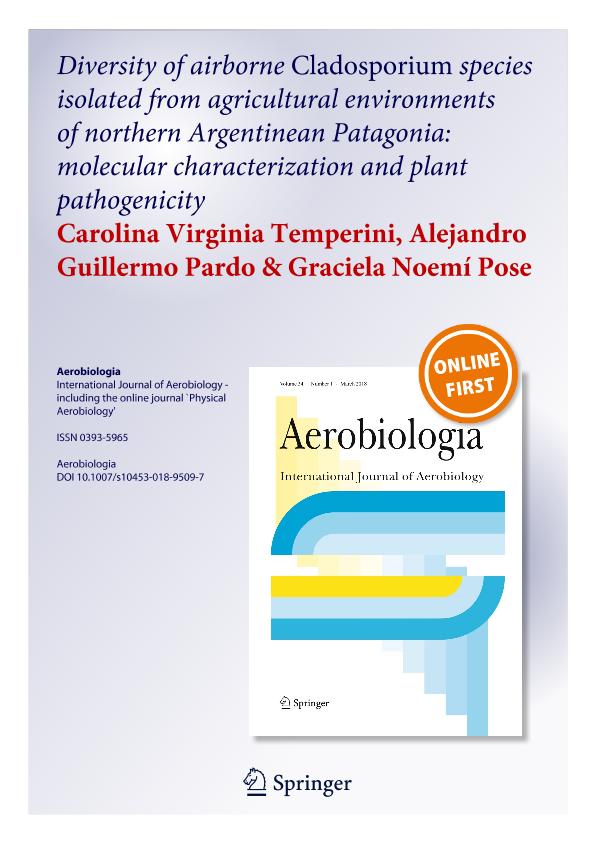Mostrar el registro sencillo del ítem
dc.contributor.author
Temperini, Carolina Virginia

dc.contributor.author
Pardo, Alejandro Guillermo

dc.contributor.author
Pose, Graciela Noemi

dc.date.available
2020-03-04T18:11:16Z
dc.date.issued
2018-06
dc.identifier.citation
Temperini, Carolina Virginia; Pardo, Alejandro Guillermo; Pose, Graciela Noemi; Diversity of airborne Cladosporium species isolated from agricultural environments of northern Argentinean Patagonia: molecular characterization and plant pathogenicity; Springer; Aerobiologia; 34; 2; 6-2018; 227-239
dc.identifier.issn
0393-5965
dc.identifier.uri
http://hdl.handle.net/11336/98767
dc.description.abstract
Fungal spores are normal components of external environments. They have been reported to be associated with human, animal and plant diseases causing primary and opportunistic infections. Cladosporium is commonly the most frequently isolated genus from air samples, and its species are considered mainly saprophytic, but there is a wide variety of taxa that can cause adverse effects on human and animal health and also on plants. In this work, we aimed to record Cladosporium spores frequency of isolation in northern Argentinean Patagonia and to perform a molecular characterization based on actin gene complemented with EF1α and ITS genes. The ability of the pathogens to cause disease in pip fruits of Packham’s Triumph and Abate Fetel pears and red delicious apples was determined. Results confirmed Cladosporium spores as the main genera isolated from air samples, and the molecular characterization revealed the existence of 11 species in this region grouped in C. cladosporioides and C. herbarum complexes. Pathogenicity tests revealed that Cladosporium sp. cause disease on fruit. Abate Fetel was the most susceptible to infection. These results compose the first study in Argentina in respect of identification at species level of airborne Cladosporium spores, and furthermore, it is the first report in northern Patagonia and the high valley of Río Negro productive region. This knowledge can help farmers to take preventive measures in order to avoid biological damage.
dc.format
application/pdf
dc.language.iso
eng
dc.publisher
Springer

dc.rights
info:eu-repo/semantics/openAccess
dc.rights.uri
https://creativecommons.org/licenses/by-nc-sa/2.5/ar/
dc.subject
AIRBORNE
dc.subject
CLADOSPORIUM
dc.subject
MOLECULAR CHARACTERIZATION
dc.subject
NORTHERN PATAGONIA
dc.subject.classification
Micología

dc.subject.classification
Ciencias Biológicas

dc.subject.classification
CIENCIAS NATURALES Y EXACTAS

dc.title
Diversity of airborne Cladosporium species isolated from agricultural environments of northern Argentinean Patagonia: molecular characterization and plant pathogenicity
dc.type
info:eu-repo/semantics/article
dc.type
info:ar-repo/semantics/artículo
dc.type
info:eu-repo/semantics/publishedVersion
dc.date.updated
2020-03-04T15:39:53Z
dc.journal.volume
34
dc.journal.number
2
dc.journal.pagination
227-239
dc.journal.pais
Alemania

dc.journal.ciudad
Berlin
dc.description.fil
Fil: Temperini, Carolina Virginia. Consejo Nacional de Investigaciones Científicas y Técnicas; Argentina. Universidad Nacional de Río Negro. Sede Alto Valle. Escuela de Producción, Tecnología y Medio Ambiente; Argentina
dc.description.fil
Fil: Pardo, Alejandro Guillermo. Universidad Nacional de Quilmes. Departamento de Ciencia y Tecnología. Laboratorio de Micología Molecular; Argentina. Consejo Nacional de Investigaciones Científicas y Técnicas; Argentina
dc.description.fil
Fil: Pose, Graciela Noemi. Universidad Nacional de Río Negro. Sede Alto Valle. Escuela de Producción, Tecnología y Medio Ambiente; Argentina. Consejo Nacional de Investigaciones Científicas y Técnicas; Argentina
dc.journal.title
Aerobiologia

dc.relation.alternativeid
info:eu-repo/semantics/altIdentifier/url/https://link.springer.com/article/10.1007/s10453-018-9509-7
dc.relation.alternativeid
info:eu-repo/semantics/altIdentifier/doi/http://dx.doi.org/10.1007/s10453-018-9509-7
Archivos asociados
